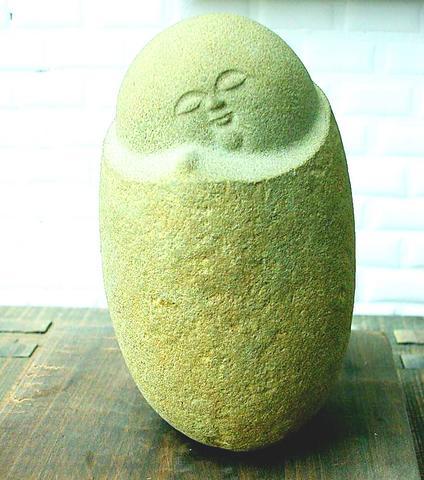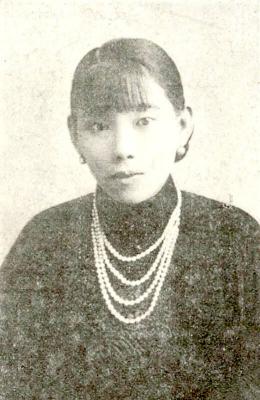The arts in Taiwan have coexisted along parallel streams, often without mutual contact. At the highest, Government-funded arts cater to the elite avant-garde who glorify university fine art departments and national or municipal museums.
Every two years in Venice, some of these Taiwanese artists meet other avant-gardists (again), exchange the latest ideas and then bring them back to their respective lands. Such contacts make the world a smaller place as images and concepts spread -- sometimes like a virus -- affecting Venice art participants and their associates at home yearning to "modernize." Their videos or installations, however, usually remain unknown to Taiwan's population at large.

PHOTO COURTESY OF FANGLIAO ARTISTS' VILLAGE
At the lowest end are the traditional "backwater" manifestations at temples and temple-markets that still exude strong regional flavors, tastes and images encountered nowhere else on earth.

In between fall high school art classes and workshops teaching people to sketch from Western plaster busts, and the vast majority of Taiwan's modern public who are too urbanized to recognize local traditions, or too lacking in art education to be interested in experiencing "modern art."
In recent years, however, there has been a healthy development in Taiwan bringing arts to people by way of artists colonies. The government has been funding imaginative reclamation projects where abandoned sugar factories in their park-like environs are transformed into open-air theaters, art galleries, warehouse-sized show-cases, conference sites and individual artists' housing complexes.
In Taiwan's southernmost Pingdong County is the little fishing village of Fangliao. Its waterways are crammed with fishing boats and nets, and its restaurants resplendent with fish and seafood freshly caught. Fangliao is celebrated for bell-shaped "Black Pearl" bell-fruit of glowing dark crimson skin, and tiny whitebait called Burahi.
Now we can say that Fangliao is celebrated also for its admirable Fangliao Artists' Village (
My visit was upon a gray day, but the sea was a bright green. Not far from the beach is the Artists' Village set along a lane with row-houses built of local dark brick. Many of these abandoned dormitories are renovated -- while keeping the original facade. Young artists and architects are invited to live and work there on an annual contract basis in the 20 two-story brick houses that function as residences.
Last year there were several avant-garde installation artists. Today there are 18 resident artists, all from Taiwan, including a woodcut printmaker, a stone sculptor, a wood sculptor, a paper sculptor, a leather carver, several oil painters, a traditional ink painter, a mosaic artist, an interior decorator, a puppet-maker and puppeteer, and a the piano and drums percussion musician.
The portly, humorous Huang Mingdao (
Huang's puppets are made of recycled bottles brightly painted. He writes the plays and goes to different districts to teach school children to make puppets, manipulate them and act out ancient local myths.
Sculptor Huang Jingyung (

Many people noticed the flood of pro-China propaganda across a number of venues in recent weeks that looks like a coordinated assault on US Taiwan policy. It does look like an effort intended to influence the US before the meeting between US President Donald Trump and Chinese dictator Xi Jinping (習近平) over the weekend. Jennifer Kavanagh’s piece in the New York Times in September appears to be the opening strike of the current campaign. She followed up last week in the Lowy Interpreter, blaming the US for causing the PRC to escalate in the Philippines and Taiwan, saying that as

Nov. 3 to Nov. 9 In 1925, 18-year-old Huang Chin-chuan (黃金川) penned the following words: “When will the day of women’s equal rights arrive, so that my talents won’t drift away in the eastern stream?” These were the closing lines to her poem “Female Student” (女學生), which expressed her unwillingness to be confined to traditional female roles and her desire to study and explore the world. Born to a wealthy family on Nov. 5, 1907, Huang was able to study in Japan — a rare privilege for women in her time — and even made a name for herself in the

Would you eat lab-grown chocolate? I requested a sample from California Cultured, a Sacramento-based company. Its chocolate, not yet commercially available, is made with techniques that have previously been used to synthesize other bioactive products like certain plant-derived pharmaceuticals for commercial sale. A few days later, it arrives. The morsel, barely bigger than a coffee bean, is supposed to be the flavor equivalent of a 70 percent to 80 percent dark chocolate. I tear open its sealed packet and a chocolatey aroma escapes — so far, so good. I pop it in my mouth. Slightly waxy and distinctly bitter, it boasts those bright,

“Taiwanese increasingly reluctant to give their lives to defend the island,” trumpeted a South China Morning Post (SCMP) headline last week. The survey asked whether people should be prepared to pay any price — including death — to protect Taiwan and prevent “reunification.” “The poll found that 52.2 percent of those questioned were unwilling to do so — an 8.4-point rise compared with a similar survey carried out two years ago — while 40.8 percent were willing, down four points on the previous survey,” the article said. Treated as anti-Taiwan propaganda, the piece was sent around by the usual pro-China suspects